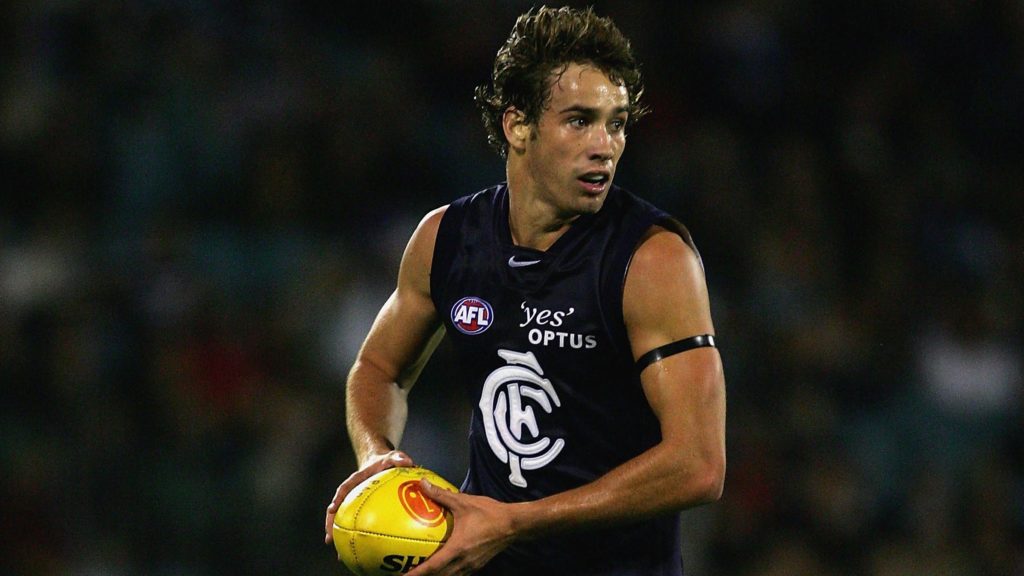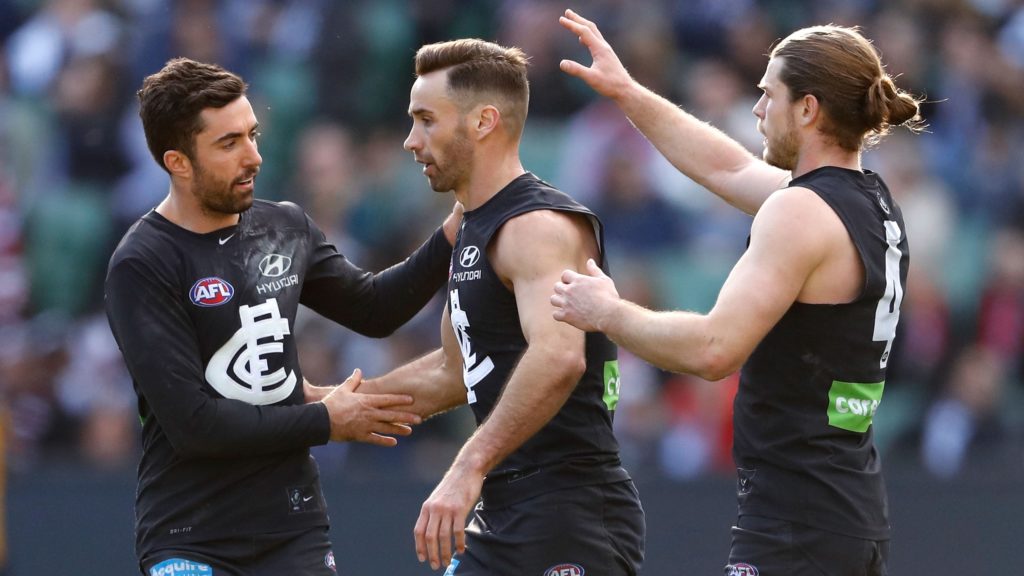Cast your mind back to 2003.
A high-flying, well-built 17-year-old is on the radar of Carlton’s club recruiters after a series of head-turning performances for the Bendigo Pioneers.
But on the eve of the draft, Andrew Walker had a confession to make.
“In my draft year I was touted to go really high, but about two weeks out from the actual draft itself, I flagged the news to a lot of the recruiting crews that I actually had knee issues,” Walker told aflplayers.com.au.
“About 12 was when I first started having issues with my knees. I had to have a lot of time off junior sport as a kid.
“Carlton still took me at number two, but it could’ve gone either way and I may or may not have got drafted because of it.”
The Blues swiftly sent Walker into surgery in a bid to repair the Echuca product’s troublesome knee, but while it was successful, the surgeon left an ominous note.
“Funnily enough on my profile from that surgeon, he basically wrote — and I’ve seen it — ‘Review in 10 years’, and nearly to the date, 10 years into my career, I started getting chronic knee pain.”

Walker had developed osteoarthritis, a disease which occurs when cartilage, protective tissue on the ends of bones, deteriorates and wears down overtime.
“From 2013 all the way through to the day I retired in 2016, I literally had day-to-day, excruciating left-knee pain caused by OA,” the 202-gamer reflected.
“It caused me all sorts of grief. Mentally, physically, my everyday living, my family, my personal wellbeing. The way that I conducted myself on a day-to-day basis, I started to really struggle.”
Though the disease is incurable, it can be alleviated by treatment.
But for Walker, like many who experience chronic pain, finding the right therapy was not an easy process.
“I’d become so sceptical of everything because I’d basically had everything,” he said. “I was trialling all sort of things, and the levels of weird strategies we used to try and get up for AFL football, there were bone broths and all sorts of really strange dietary things and what-not, we trialled them.”
But in 2017, with the prospect of a partial knee replacement lingering, Walker found hope.
“I was part of a trial for a drug called pentosan polysulphate sodium, or PPS, which literally saved me,” he said.
“I can’t talk more highly about that trial and that drug itself. I was booked in for a partial knee replacement in 2017, and I avoided that.”
PPS was first developed with the goal of treating blood clots, but has since been used to ease pain caused by osteoarthritis through its anti-inflammatory effects and ability to address bone marrow damage.
“[Post-retirement] I’ve gone on to play roughly 75 games of division one football, I run most days, I gym basically every off-day from that,” Walker explained.
“Things are pretty good for me, but I certainly had a big period of my life there where I’ve been living with post-AFL chronic pain. There was a massive turnaround there. Certain things are going to work for different people”
Walker has a key message for those experiencing chronic pain: “Make sure you have really open conversations with the people you’re close to, or people that are in the same position as you,” he said.
“The more open I was about what I was dealing with, the better I felt. It’s really important to surround yourself around people that understand you personally, but are also in similar situations.
“I always felt really comfortable with the likes of Michael Jamison, David Ellard, Dale ‘Daisy’ Thomas, Marc Murphy or Kade Simpson, to just grab them and say, ‘Hey, I’m really struggling here’.”
Medical costs and expenses for a dental injury incurred whilst training or playing with an AFL/VFL club may also be reimbursable under the program, while there is also a player wellness offering for players as well.
Speaking to others who face similar struggles, Walker says, is another key step in overcoming the pain predicament.
For the 35-year-old, that came in the form of legendary Hawthorn and Port Adelaide champion Shaun Burgoyne, who tamed his own bout of knee trouble in 2009 to add a further 12 years to his career.
“Another one I spoke to really early days was Shaun Burgoyne. His story speaks for itself. He’s got osteoarthritis in his knees, and I had a great conversation with him. It was just invaluable,” Walker reflected.
“It was only 30 minutes, and I remember walking away from it going, ‘I haven’t tried that, and I haven’t tried that, can’t wait to rip into it’, so you give yourself every opportunity by having open conversations with people that are in a similar spot to you.”

But ultimately, Andrew Walker’s knees will be remembered for one particular moment: when they were sitting comfortably on Jake Carlisle’s shoulders back in 2011, as he held onto one of the great all-time marks.
“If I had a dollar for every time someone mentioned my mark, I’d be a millionaire,” Walker joked. “Probably on a weekly basis I still get asked about that mark, or someone brings it up.
“I did play for 12 years, reached a couple of great milestones and played finals footy, but as a singular highlight, that would be the one that’s most memorable from my career.
“I’ve got young kids now as well, two boys (Cody and Arli) and a little girl (Leti), and they’re right into their football. [Cody] is in year eight playing under 14s, [Arli] is under 12s, so they’ve seen it a fair bit and they bring it up.
“They’re probably better athletes than I was, to be honest, so I’m very much looking forward to seeing where they take their football.”
